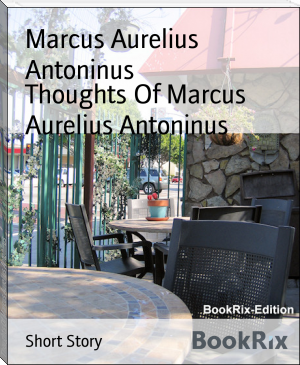Thoughts Of Marcus Aurelius Antoninus, Marcus Aurelius Antoninus [best ereader for pc .TXT] 📗

- Author: Marcus Aurelius Antoninus
Book online «Thoughts Of Marcus Aurelius Antoninus, Marcus Aurelius Antoninus [best ereader for pc .TXT] 📗». Author Marcus Aurelius Antoninus
The Common Greek Word Which We Translate "Matter" Is [Greek:
Hylê]. It Is The Stuff That Things Are Made Of.
Matter Consists Of Elemental Parts ([Greek: Stoicheia]) Of Which All
Material Objects Are Made. But Nothing Is Permanent In Form. The Nature
Of The Universe, According To Antoninus' Expression (Iv. 36), "Loves
Nothing So Much As To Change The Things Which Are, And To Make New
Things Like Them. For Everything That Exists Is In A Manner The Seed Of
That Which Will Be. But Thou Art Thinking Only Of Seeds Which Are Cast
Into The Earth Or Into A Womb: But This Is A Very Vulgar Notion." All
Things Then Are In A Constant Flux And Change; Some Things Are Dissolved
Into The Elements, Others Come In Their Places; And So The "Whole
Universe Continues Ever Young And Perfect" (Xii. 23).
Antoninus Has Some Obscure Expressions About What He Calls "Seminal
Principles" ([Greek: Spermatikoi Logoi]). He Opposes Them To The
Epicurean Atoms (Vi. 24), And Consequently His "Seminal Principles" Are
Not Material Atoms Which Wander About At Hazard, And Combine Nobody
Knows How. In One Passage (Iv. 21) He Speaks Of Living Principles, Souls
([Greek: Psychahi]) After The Dissolution Of Their Bodies Being
Received Into The "Seminal Principle Of The Universe." Schultz Thinks
That By "Seminal Principles Antoninus Means The Relations Of The Various
Elemental Principles, Which Relations Are Determined By The Deity And By
Which Alone The Production Of Organized Beings Is Possible." This May Be
The Meaning; But If It Is, Nothing Of Any Value Can Be Derived From
It.[A] Antoninus Often Uses The Word "Nature" ([Greek: Physis]), And We
Must Attempt To Fix Its Meaning, The Simple Etymological Sense Of
[Greek: Physis] Is "Production," The Birth Of What We Call Things. The
Romans Used Natura, Which Also Means "Birth" Originally. But Neither The
Greeks Nor The Romans Stuck To This Simple Meaning, Nor Do We. Antoninus
Says (X. 6): "Whether The Universe Is [A Concourse Of] Atoms Or Nature
[Is A System], Let This First Be Established, That I Am A Part Of The
Whole Which Is Governed By Nature." Here It Might Seem As If Nature Were
Personified And Viewed As An Active, Efficient Power; As Something
Which, It Not Independent Of The Deity, Acts By A Power Which Is Given
To It By The Deity. Such, If I Understand The Expression Right, Is The
Way In Which The Word Nature Is Often Used Now, Though It Is Plain That
Many Writers Use The Word Without Fixing Any Exact Meaning To It. It Is
The Same With The Expression Laws Of Nature, Which Some Writers May Use
In An Intelligible Sense, But Others As Clearly Use In No Definite Sense
At All. There Is No Meaning In This Word Nature, Except That Which
Bishop Butler Assigns To It, When He Says, "The Only Distinct Meaning Of
That Word Natural Is Stated, Fixed, Or Settled; Since What Is Natural As
Much Requires And Presupposes An Intelligent Agent To Render It So,
_I.E._, To Effect It Continually Or At Stated Times, As What Is
Supernatural Or Miraculous Does To Effect It At Once." This Is Plato's
Meaning (De Leg., Iv. 715) When He Says That God Holds The Beginning And
End And Middle Of All That Exists, And Proceeds Straight On His Course,
Making His Circuit According To Nature (That Is By A Fixed Order); And
He Is Continually Accompanied By Justice, Who Punishes Those Who Deviate
From The Divine Law, That Is, From The Order Or Course Which God
Observes.
[A] Justin (Apol. Ii. 8) Has The Words [Greek: Kata
Spermatikou Logou Meros], Where He Is Speaking Of The Stoics
Story 2 (The Philosophy Of Marcus Aurelius Antonius) Pg 21But He Uses This Expression In A Peculiar Sense (Note Ii). The
Early Christian Writers Were Familiar With The Stoic Terms, And
Their Writings Show That The Contest Was Begun Between The
Christian Expositors And The Greek Philosophy. Even In The
Second Epistle Of St. Peter (Ii. I, V. 4) We Find A Stoic
Expression, [Greek: Ina Dia Toutôn Genêsthe Theias Koinônoi
Physeôs.]
When We Look At The Motions Of The Planets, The Action Of What We Call
Gravitation, The Elemental Combination Of Unorganized Bodies And Their
Resolution, The Production Of Plants And Of Living Bodies, Their
Generation, Growth, And Their Dissolution, Which We Call Their Death, We
Observe A Regular Sequence Of Phenomena, Which Within The Limits Of
Experience Present And Past, So Far As We Know The Past, Is Fixed And
Invariable. But If This Is Not So, If The Order And Sequence Of
Phenomena, As Known To Us, Are Subject To Change In The Course Of An
Infinite Progression,--And Such Change Is Conceivable,--We Have Not
Discovered, Nor Shall We Ever Discover, The Whole Of The Order And
Sequence Of Phenomena, In Which Sequence There May Be Involved According
To Its Very Nature, That Is, According To Its Fixed Order, Some
Variation Of What We Now Call The Order Or Nature Of Things. It Is Also
Conceivable That Such Changes Have Taken Place,--Changes In The Order Of
Things, As We Are Compelled By The Imperfection Of Language To Call
Them, But Which Are No Changes; And Further It Is Certain That Our
Knowledge Of The True Sequence Of All Actual Phenomena, As For Instance
The Phenomena Of Generation, Growth, And Dissolution, Is And Ever Must
Be Imperfect.
We Do Not Fare Much Better When We Speak Of Causes And Effects Than When
We Speak Of Nature. For The Practical Purposes Of Life We May Use The
Terms Cause And Effect Conveniently, And We May Fix A Distinct Meaning
To Them, Distinct Enough At Least To Prevent All Misunderstanding. But
The Case Is Different When We Speak Of Causes And Effects As Of Things.
All That We Know Is Phenomena, As The Greeks Called Them, Or Appearances
Which Follow One Another In A Regular Order, As We Conceive It, So That
If Some One Phenomenon Should Fail In The Series, We Conceive That There
Must Either Be An Interruption Of The Series, Or That Something Else
Will Appear After The Phenomenon Which Has Failed To Appear, And Will
Occupy The Vacant Place; And So The Series In Its Progression May Be
Modified Or Totally Changed. Cause And Effect Then Mean Nothing In The
Sequence Of Natural Phenomena Beyond What I Have Said; And The Real
Cause, Or The Transcendent Cause, As Some Would Call It, Of Each
Successive Phenomenon Is In That Which Is The Cause Of All Things Which
Are, Which Have Been, And Which Will Be Forever. Thus The Word Creation
May Have A Real Sense If We Consider It As The First, If We Can Conceive
A First, In The Present Order Of Natural Phenomena; But In The Vulgar
Sense A Creation Of All Things At A Certain Time, Followed By A
Quiescence Of The First Cause And An Abandonment Of All Sequences Of
Phenomena To The Laws Of Nature, Or To The Other Words That People May
Use, Is Absolutely Absurd.[A]
[A] Time And Space Are The Conditions Of Our Thought; But Time
Infinite And Space Infinite Cannot Be Objects Of Thought,
Except In A Very Imperfect Way. Time And Space Must Not In Any
Way Be Thought Of When We Think Of The Deity. Swedenborg Says,
"The Natural Man May Believe That He Would Have No Thought, If
Story 2 (The Philosophy Of Marcus Aurelius Antonius) Pg 22The Ideas Of Time, Of Space, And Of Things Material Were Taken
Away; For Upon Those Is Founded All The Thought That Man Has.
But Let Him Know That The Thoughts Are Limited And Confined In
Proportion As They Partake Of Time, Of Space, And Of What Is
Material; And That They Are Not Limited And Are Extended, In
Proportion As They Do Not Partake Of Those Things; Since The
Mind Is So Far Elevated Above The Things Corporeal And Worldly"
(Concerning Heaven And Hell, 169).
[Illustration: The Temple Of Pallas]
Now, Though There Is Great Difficulty In Understanding All The
Passages Of Antoninus, In Which He Speaks Of Nature, Of The Changes Of
Things And Of The Economy Of The Universe, I Am Convinced That His Sense
Of Nature And Natural Is The Same As That Which I Have Stated; And As He
Was A Man Who Knew How To Use Words In A Clear Way And With Strict
Consistency, We Ought To Assume, Even If His Meaning In Some Passages Is
Doubtful, That His View Of Nature Was In Harmony With His Fixed Belief
In The All-Pervading, Ever Present, And Ever Active Energy Of God. (Ii.
4; Iv. 40; X. 1; Vi. 40; And Other Passages. Compare Seneca, De Benef.,
Iv. 7. Swedenborg, Angelic Wisdom, 349-357.)
There Is Much In Antoninus That Is Hard To Understand, And It Might Be
Said That He Did Not Fully Comprehend All That He Wrote; Which Would
However Be In No Way Remarkable, For It Happens Now That A Man May Write
What Neither He Nor Anybody Can Understand. Antoninus Tells Us (Xii. 10)
To Look At Things And See What They Are, Resolving Them Into The
Material [Greek: Hylê], The Casual [Greek: Aition], And The Relation
[Greek: Anaphora], Or The Purpose, By Which He Seems To Mean Something
In The Nature Of What We Call Effect, Or End. The Word Caus ([Greek:
Aitia]) Is The Difficulty. There Is The Same Word In The Sanscrit
(Hétu); And The Subtle Philosophers Of India And Of Greece, And
The Less Subtle Philosophers Of Modern Times, Have All Used This Word,
Or An Equivalent Word, In A Vague Way. Yet The Confusion Sometimes May
Be In The Inevitable Ambiguity Of Language Rather Than In The Mind Of
The Writer, For I Cannot Think That Some Of The Wisest Of Men Did Not
Know What They Intended To Say. When Antoninus Says (Iv. 36), "That
Everything That Exists Is In A Manner The Seed Of That Which Will Be,"
He Might Be Supposed To Say What Some Of The Indian Philosophers Have
Said, And Thus A Profound Truth Might Be Converted Into A Gross
Absurdity. But He Says, "In A Manner," And In A Manner He Said True; And
In Another Manner, If You Mistake His Meaning, He Said False. When Plato
Said, "Nothing Ever Is, But Is Always Becoming" ([Greek: Aei
Gignetai]), He Delivered A Text, Out Of Which We May Derive Something;
For He Destroys By It Not All Practical, But All Speculative Notions Of
Cause And Effect. The Whole Series Of Things, As They Appear To Us, Must
Be Contemplated In Time, That Is In Succession, And We Conceive Or
Suppose Intervals Between One State Of Things And Another State Of
Things, So That There Is Priority And Sequence, And Interval, And Being,
And A Ceasing To Be, And Beginning And Ending. But There Is Nothing Of
The Kind In The Nature Of Things. It Is An Everlasting Continuity (Iv.
45; Vii. 75). When Antoninus Speaks Of





Comments (0)